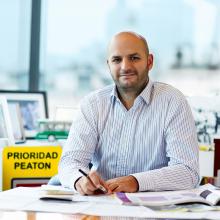Towards a friendlier mobility
ROOM: Cámara
2nd Thematic Session on Sustainability
Organized by: METROPOLIS and Government of the City of Buenos Aires
The subject of this meeting arose as a result of the identification of a central problem for cities: the excessive prominence of the motor car, which generates other drawbacks such as traffic jams, pollution, illness, and lack of safety. In order to resolve this, designing transport to be more friendly has been proposed as a way of making cities more sustainable, human, accessible, and healthy, with the aim of reducing traffic and making people’s travel more reliable.
In contemporary urban society, mobility is an essential condition for accessing goods and services and managing different daily living activities. This is why boosting connectivity means improving urban equity and triggering a virtuous cycle with positive effects on social cohesion. Guaranteeing the maximum level of accessibility and providing it at the lowest possible social cost is a major global challenge for our cities.
In past decades, we've seen see how the design of large cities focused on awarding a leading role to automobiles over people. As these conditions hassle the circulation of pedestrians and bicycles, every citizen who needs to move around such cities on a daily basis has to face major problems, which range from large-scale traffic jams to health problems deriving from vehicle emissions and safety risks.
No commitment to a sustainable and humane city will be complete if friendlier mobility is not guaranteed, in a model which promotes healthy mobility (cycling and/or walking), to shore up the idea that pedestrians have priority, as they are the most vulnerable parties with regards transport. Friendly mobility pursues traffic calming, guaranteeing travel and accessibility to people. In this regard, it is essential that urban planning fosters the mobility of pedestrians and bicycles, recovering the public space and targeting it at walking and the construction of bike paths, as well as efficient public transport, both within cities and on an inter-urban basis. These measures must be complemented by policies to revitalize local services and businesses in neighborhoods to minimize unnecessary travel.
In a debate moderated by Daniely Votto Fontoura, Head of Strategic Relations at EMBARQ Brazil, and taking questions from the audience, the following experiences were shared:
- Buenos Aires: 'The Sustainable Mobility Plan' by Juanjo Méndez, Head of the Committee of the Transport Subsecretariat of Buenos Aires City Government
- Johannesburg: 'Friendly mobility in the city' by Lisa Seftel, Executive Director of the Department of Transport of the City of Johannesburg.
- Seoul: 'The Project for the recovery of the River Chenggyecheon' by Soohjun Kim, Director of the Seoul Institute.
- Rio de Janeiro: ‘Policies of mobility in 2016 Olympic Games' by Diego Blanc, Advisor on Institutional Relations and Bilateral Co-operation for the Rio de Janeiro City Hall.
The presentations tackled the way in which urban initiatives in transport matters have benefits for citizens’ quality of life (pedestrians, cyclists, public transport users, traders, businesses, etc.), as well as on the economic and social development of the city. The participants in this session shared the experiences of their cities, explaining how, through urban planning, they had been able to recover public spaces, build cycle lanes, administer transport efficiently, and revitalize services and businesses in local areas in order to reduce unnecessary travel. The essence of this subject is to understand that genuine transformation is possible with changes in three areas: infrastructure, operations, and behaviour.
Some measures which were highlighted include the Rea Vaya Rapid Bus Transit, the promotion of cycling and the use of minibus taxis in Johannesburg; the transoeste, transcarioca, and transolímpica Rapid Bus Transit along with the promotion of cycling in Rio de Janeiro, and pedestrianization in Buenos Aires along with the Metrobus and Ecobici schemes. The project in Seoul involved the restoration of Cheonggyecheon, a canal buried under the Cheonggye Highway which used to result in a poor quality of life, depopulation, and the running down of the centre.
In the case of Buenos Aires, the Sustainable Transport Plan has been implemented, which works on a paradigm shift based on thinking out public spaces in terms of mobility and not just transport. As such, there is more focus on the person and not just on the motor car or the bus. Within this framework, the Buenos Aires Sustainable Transport Plan has as its aim the improvement of the quality of life of residents, working on themes such as the priority of public transport, for which the main action is the construction of the Metrobus corridors. Currently, the network is 38 km in length and has an impact on the quality of the travel experience for over 640,000 people every day. With regard to healthy mobility, the aim is to promote travel by bicycle and on foot through the construction of a network of cycle lanes and the creation of a system of public bicycles known as Ecobici, as well as improving walkability by creating friendly environments for pedestrians.










